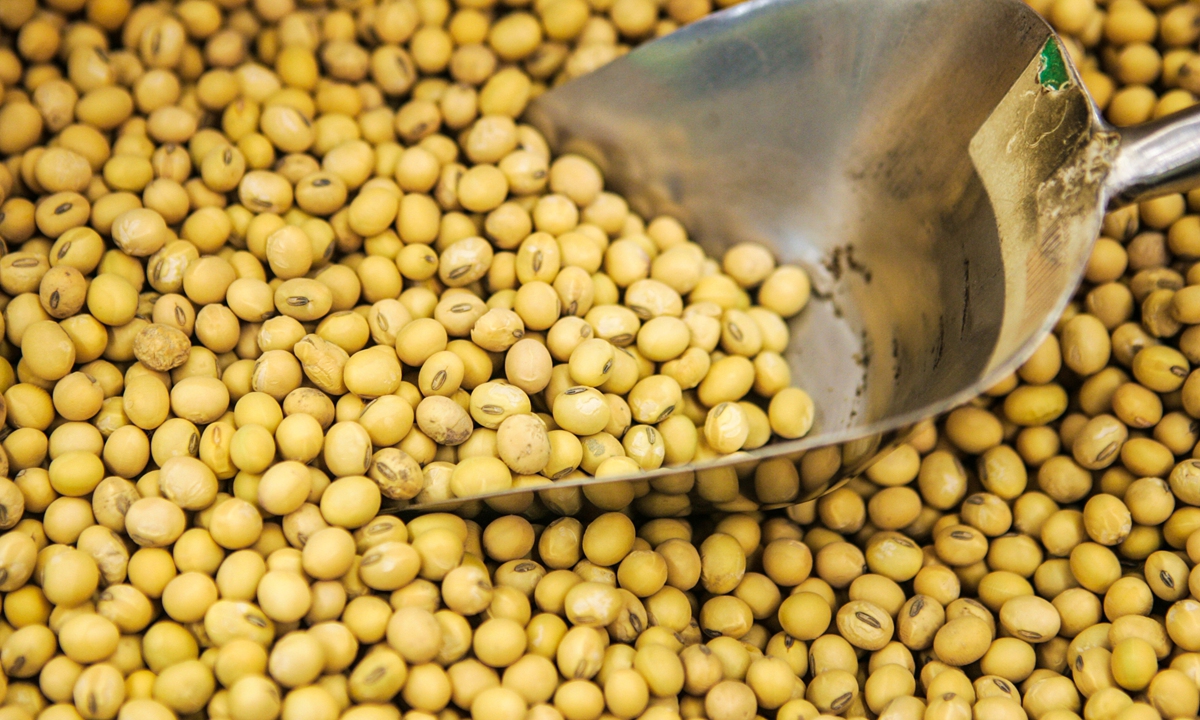Soybean Photo: VCG
The US-launched tariff confrontation has begun to hit American agricultural exports, particularly soybeans and pork, as China’s Zhejiang Province is seeing a surge in Brazilian soybean shipments arriving at its ports.
In April, around 40 Brazilian soybean ships are expected to dock at Zhoushan port, Ningbo, East China’s Zhejiang Province, a 48 percent year-on-year increase from the 27 shipments recorded in April last year, Yuyuantantian, a social media account affiliated with China Media Group reported on Monday.
The report citing source said multiple Brazilian soybean vessels have been docking daily at the Laotangshan terminal of Ningbo Zhoushan port in recent days, projecting that the port will unload 700,000 tons of Brazilian soybeans this April, up 32 percent from last year’s 530,000 tons.
This is the most direct manifestation of how the tariff confrontation provoked by the US is harming its key industries and ordinary citizens, and it also demonstrates that most of the products China imports from the US can be sufficiently substituted by sourcing from other countries across the globe, a Chinese expert said.
Data from the US Department of Agriculture (USDA) showed that exports of American agricultural products, including soybeans and pork, have been declining sharply, for the period April 11-17, 2025, the first full week reporting period after the US-provoked tariff escalation with China.
Net sales of US soybeans dropped by 50 percent compared to the previous week, while net pork sales plummeted by 72 percent at the same period, per a release the Global Times read at department’s official website.
China cut back on its US soybean purchases and reduced the amount of pork it plans to import from the US in 2025.
China purchased only 1,800 tons of soybeans in the period, a far cry from the 72,800 tons it purchased in the week ended April 10, the Wall Street Journal (WSJ) reported citing USDA data on April 24.
USDA data also showed a 12,000-ton reduction in previously announced purchases of US pork by China, cutting total sales for the week ended April 17 to a mere 5,800 tons. That is the lowest figure for 2025 delivery reported so far this year, and off 72 percent from the prior week, the WSJ report said.
It is evident that the US agricultural sector is already suffering from the tariffs, as products like soybeans and pork heavily rely on the Chinese market, Li Yong, a senior research fellow at the China Association of International Trade, told the Global Times on Monday.
“China’s vast market and strong purchasing power mean that tariffs have disrupted previously established trade relationships,” Li noted.
By instigating a tariff war, the US is voluntarily excluding itself from China’s enormous market, according to Li, adding “Despite being a highly competitive supplier in the global market, the tariffs have forced American farmers to lose market share to competitors.”
The WSJ cited analysts’ predictions that prices for agricultural commodities could come under sharp pressure if this trend continues.
Since January, the US has repeatedly imposed tariffs on Chinese goods, deliberately sparking a new round of trade disputes. In response, China swiftly implemented countermeasures. Starting March 10, China imposed a 15 percent tariff on US-origin chicken, wheat, corn, and cotton, and a 10 percent tariff on sorghum, soybeans, pork, beef, seafood, fruits, vegetables, and dairy products.
Li predicts that the US tariffs will lead China to shift toward purchasing more agriculture products from other countries, reducing the US share in the Chinese market.
China has been actively diversifying its agricultural imports in recent years, with Brazil surpassing the US to become its top soybean supplier, CCTV reported earlier. Market data revealed that between 2016 and 2024, the US share of China’s soybean imports plummeted from 40 percent to just 18 percent, per the report.
Industry data showed that China imported 416,000 tons of pork from the US, accounting for 18 percent of its total pork imports last year. In 2024, China was the third-largest pork market for the US, while the US was China’s third-largest meat supplier, following Brazil and Argentina.
“Whether for soybeans, pork, or beef, China can find ample substitutes from other agricultural exporters such as Brazil, Argentina, and Australia, whose trade policies are more open than those of the US,” Li noted, emphasizing that US tariffs will likely accelerate trade diversion, further strengthening China’s cooperation with these countries.
Li urged the US government should recognize the consequences of its tariffs. “Only by lifting all unilateral tariffs can it truly address the challenges faced by its affected industries,” Li noted, stressing that protectionism will not achieve the US government’s intended goals.









